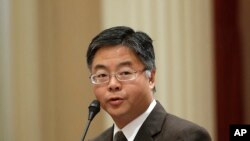ການເພີ້ມຈຳນວນຂຶ້ນໃນການປ່ອນບັດລ່ວງໜ້າ ຂອງຊາວອາເມຣິກັນເຊື້ອສາຍ ເອເຊຍ ສ່ວນນຶ່ງກໍແມ່ນເປັນຍ້ອນຜູ້ສະໝັກປະທານາທິບໍດີຂອງພັກຣີພັບບລິກັນ ທ່ານ Donald Trump ໂດຍບັນດາຜູ້ສະໝັກຈຳນວນນຶ່ງ ໃນຕຳແໜ່ງທີ່ຕ່ຳລົງມາ. ມັນຍັງເປັນຫລັກຖານສະແຫງໃຫ້ເຫັນວ່າ ປະຊາຊົນກຸ່ມນີ້ໄດ້ໃຫ້ຄວາມສົນ ໃຈເພີ້ມຂຶ້ນຢູ່ໃນການເມືອງສະຫະລັດ.
ອົງການວິເຄາະປະຊາທິປະໄຕ Catalist ລາຍງານວ່າ ຊາວອາເມຣິກັນເຊື້ອສາຍເອເຊຍ ພາກັນປ່ອນບັດລົງຄະແນນສຽງໃນຈຳນວນເພີ້ມຂຶ້ນ ຢູ່ໃນບັນດາລັດ ບ່ອນທີ່ມີຄະແນນສຽງປ່ຽນໄປມາ ທີ່ອາດສາມາດເປັນຜູ້ຕັດສິນຊີ້ຂາດ ການເລືອກຕັ້ງປະທານາທິບໍດີ ໃນປີ 2016.
ສະມາຊິກສະພາຕໍ່າອາເມຣິກັນເຊື້ອສາຍເອເຊຍ ທີ່ສັງກັດພັກເດໂມແຄຣັດ ທ່ານ Ted Lieu ກ່າວວ່າ ການເພີ້ມຈຳນວນຂອງຊາວອາເມຣິກັນເຊື້ອສາຍເອເຊຍທີ່ໄປໜ່ວຍປ່ອນບັດ ສາມາດຕິດຕາມນຳຮ່ອງຮ້ອຍໄດ້ຈາກການໂຄ ສະນາຫາສຽງຂອງທ່ານ Trump.
ທ່ານ Lieu ກ່າວວ່າ “ຖ້າຫາກທ່ານເຫັນການປ່ອນບັດລົງຄະແນນສຽງລ່ວງໜ້າ ທີ່ມີຂຶ້ນ ຢູ່ໃນລັດ Nevada ແລະ Florida ແລ້ວ ແມ່ນມີຜົນມາຈາກການໂຄສະນາຫາສຽງຂອງທ່ານ Trump ແລະໄດ້ພາໃຫ້ມີຊາວລາຕິນ ແລະຊາວອາເມຣິກັນເຊື້ອສາຍເອເຊຍ ໄປປ່ອນບັດ. ທ່ານມີຊົນກຸ່ມນ້ອຍຈຳນວນຫຼວງຫລາຍ ບໍ່ມັກໄປປ່ອນບັດປານໃດ ເວລານີ້ພາກັນປ່ອນບັດ ເພາະວ່າເຂົາເຈົ້າອາດຈະຢ້ານ ຫລືໂກດແຄ້ນຕໍ່ທ່ານ Donald Trump.”
ໃນຂະນະທີ່ທ່າທີຂອງທ່ານ Trump ແລະບາງຄັ້ງມີຄຳເວົ້າທີ່ຂັດແຍ້ງກ່ຽວກັບນະໂຍບາຍ
ຄົນເຂົ້າເມືອງ ອາດຈະຊັກຊວນໃຫ້ບັນດາຊົນກຸ່ມນ້ອຍຈຳນວນນຶ່ງພາກັນໄປປ່ອນບັດ ຊຶ່ງຄູ່ແຂ່ງຂອງທ່ານ Lieu ທີ່ສັງກັດພັກຣີພັບບລິກກັນ ທີ່ເປັນໝໍຜ່າຕັດຕາເດັກນ້ອຍ ທ່ານ Kenneth Wright ກ່າວວ່າ ຄວາມປອດໄພດ້ານຊາຍແດນເປັນສິ່ງນຶ່ງທີ່ຊັກຊວນໃຫ້ທ່ານ
ລົງສະໝັກແຂ່ງກັບທ່ານ Lieu.
ທ່ານ Wright ກ່າວວ່າ “ພວກເຮົາບໍ່ສາມາດທີ່ຈະເປີດຊາຍແດນ. ມີພວກຄ້າມະນຸດພາ
ກັນຂ້າມຊາຍແດນ. ຢາເສບຕິດ ສິ່ງຮ້າຍແຮງ ພວກກໍ່ການຮ້າຍສາ ມາດຂ້າມເຂົ້າມາໄດ້ ພວກເຮົາບໍ່ສາມາດທີ່ຈະເປີດຊາຍແດນ. ເຖິງເວລາແລ້ວ ທີ່ປະຊາຊົນພາກັນລຸກຂຶ້ນຕ້ານບັນດານັກການເມືອງອາຊີບ ແລະໄລ່ເຂົາເຈົ້າໜີອອກໄປ ແລະນຳເອົາປະຊາຊົນທີ່ເປັນສັນຊາດ ທີ່ຕ້ອງການຢາກເຮັດວຽກໃຫ້ ແກ່ອາເມຣິກາເຂົ້າຮັບໜ້າທີ່ແທນ.
A surge in Asian Americans voting early is being attributed to Republican presidential candidate Donald Trump by some down ballot candidates. It's also evidence that the demographic has growing clout in U.S. politics.
The Democratic analytical firm Catalist reports that Asian-Americans are voting in increased numbers in the swing states that could determine the outcome of the 2016 presidential election
Asian American Democratic congressman Ted Lieu said the increased number of Asian Americans going to the polls can be traced to Trump's campaign.
"If you see the early votes that have happened, in Nevada and in Florida, there has been a Trump effect, and that is you have Latinos and Asian Americans surging in voting. You have a lot of minorities who are low propensity voters now voting because they are either scared or mad at Donald Trump," said Lieu.
While Trump's stance and sometimes controversial statements about U.S. immigration policy may be motivating some minority groups to head to the polls, Lieu's Republican opponent, pediatric eye surgeon Kenneth Wright, said border security is one of things that motivated him to run against Lieu.
"We can't have open borders. There are human traffickers coming across that border. Drug, horrible, terrorist could come across, we can't have open borders." Wright said. "It's time citizens stand up against career politicians and get them the heck out and put in people that are citizens that want to work for America."
Rising political clout
The early voting surge also reflects that the growing Asian American electorate is a group that is gaining political power in the U.S.
The number of Asians running for political office is also increasing said Representative Judy Chu, the first Chinese American woman elected to the U.S. Congress. She is also Chairwoman of the Congressional Asian Pacific American Caucus. There are currently 33 Asian and Pacific Islander candidates across the country running for federal office according to the Asian Pacific American Institute for Congressional Studies (APAICS).
Chu and Lieu are both running for reelection in predominantly Democratic districts in Southern California.
While Chu represents a district that is largely Asian and Latino, Lieu's district includes a large population of Jewish Americans as well as Asian Americans.
Chu's Republican opponent, former FBI agent and small business owner, Jack Orswell had tried to run against Chu several times before, but this time, he said the Trump effect could make the outcome of races unpredictable.
"I don't know what the Trump effect is. All I know is its going to be extremely different from any previous election, and as a down ticket candidate my election chances are dependent on the presidential race," said Orswell.
Future of Asian and Pacific Islander candidates
Beyond the White House in this election, Chu said the down ballot Asian and Pacific Islander candidates need to be coalition candidates to win their race.
"Nearly every Asian Pacific Islander candidate runs in a district that is not majority Asian. That's the nature of America." Chu continued, "We have to make sure that we reach out to everybody of every ethnic background and that we have a message that's universal for all of them," said Chu.
As for the Asian American electorate, Chu said this demographic is becoming the margin of victory in many swing states.
"In the last decade, we have doubled our voter registration numbers from two to four million and in certain states that are making a big difference in this election, Nevada, Virginia, Pennsylvania, North Carolina, we are a swing population." Chu continued, "Just think if we can swing Nevada, we can swing Virginia, we can actually determine who the next president of the United States will be."





